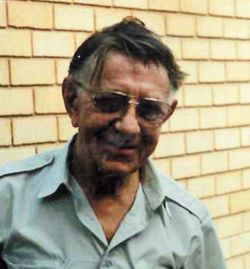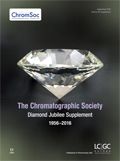ChromSoc Activities: The Reid International Bioanalytical Forum
Special Issues
The Reid International Bioanalytical Forum is a conference geared towards bioanalytical scientists. It has a unique philosophy where challenging data is often presented to an audience who are encouraged to engage. This article describes how the meeting series was initiated and developed over the past 40 years and how this philosophy has been embedded into the meeting.
Tony Edge1, Ray Briggs2, and Derek Stevenson3, 1Agilent Technologies, Stockport, Cheshire, UK, 2Eurofins Pharma Bioanalysis Services UK Limited., Oxford, UK, 3University of Surrey, UK.
The late Eric Reid, founder of The Reid International Bioanalytical Forum

The Reid International Bioanalytical Forum is a conference geared towards bioanalytical scientists. It has a unique philosophy where challenging data is often presented to an audience who are encouraged to engage. This article describes how the meeting series was initiated and developed over the past 40 years and how this philosophy has been embedded into the meeting.
The very first Reid International Bioanalytical Forum was organized by the late Eric Reid at the University of Surrey, UK, in 1975. It was a great success and provided a launchpad for an incredibly successful series of meetings that have been held at Surrey ever since. The success of the meetings is down to the style of the lectures and the participation of the delegates, whether it is in the intellectual confines of the lecture hall or more likely the numerous social events that the committee has organized over the years. These events continued the intellectual debates and also fostered a real community spirit within the meeting. This philosophy has been engendered by subsequent organizing committees to maintain the meeting in the ethos that Eric Reid had instilled from the start.
Eric arranged the first set of meetings in a style that was unique to his own approach to “organizational excellence”. This was part of the attraction of the meetings, as the informality associated with the registration process and indeed the lecture slots fed very easily into the delegates and the types of interactions that were often present within the forum. This was further enhanced by the various social activities that often involved a degree of alcohol, but always had a friendly atmosphere that was welcoming of both frequent visitors and those on their first visit. The meeting encouraged not only experienced presenters to come and share groundbreaking research but were also a safe haven for first-time presenters to develop and become part of the community, including some of the present organizing committee. The tone and community of the meeting has fostered the opportunity for people to present some, not always, perfect data or scenarios - it has been easy to present problems and say “we don’t know why” to get insights from the community. The meeting attracted the best bioanalytical minds and had a huge influence on the development of bioanalysis as a discipline, often leading the debate in important topics such as sample preparation and method validation.
Eric Reid was born in Aberdeen and studied chemistry at the university from 1939 to 1943 before working at the Lister Institute in London, UK, until 1946. He completed his PhD at UCL in 1949 and then moved to Cambridge (with F.C. Young), where he embarked on a second PhD - Cambridge apparently not recognizing the one from UCL. In an illustrious academic career that saw Eric move from the Chester Beatty Research Institute, his studies moved towards biochemistry, particularly nucleic acid metabolism, subcellular, and membrane biochemistry in normal and cancerous tissue. In 1964, he joined the Battersea College of Technology where he founded the Biochemistry Unit. The award of the Royal Charter in 1966 to Battersea - forming the new University of Surrey - was a moment of celebration. In 1971 his department moved to the current campus site and a couple of years later, with the aid of a pumpâpriming grant from the Wolfson Foundation, the Wolfson Bioanalytical Centre was formed, with Eric steering it through a very active, productive, and academically successful period in the areas of analytical methodology and subcellular biochemistry. It was during this period that the first Bioanalytical Forum was held in 1975.
With his wife Joan’s support and the recruitment of trustees, Eric started the Guildford Academic Associates (GAA), a charity devoted initially to continuing the Bioanalytical Conferences and publication of methodological surveys. GAA also endowed the “Guildford Bench Methodology Fund” within the Biochemical Society. Eventually the Chromatographic Society took over the Bioanalytical Conferences in 1995, although Eric continued to have an input into the organization of the event well beyond this date. His academic career at Guildford ended in 1982, but the focus of the GAA meant that Eric was still very active, as well as being incredibly generous - donating the majority of his life savings to a range of worthwhile causes. In recognition of his efforts to support the Forum and his role in ensuring its success, the organizing committee altered the name to the Reid Forum, a very appropriate tribute to the great man. It was with great sadness that Eric passed away in 2010, a short time after the Forum had been renamed.
The following forum did miss Eric’s influence, however, the team of Ian Wilson, Howard Hill, Derek Stevenson, Steve Westwood, Robin Whelpton, and Richard Houghton did an admirable job of ensuring the continuing success of the event and maintaining the ethos created by Eric. There were still the tales echoed throughout the early morning sessions of the night before antics, with many legends being created in the confines of the university. Indeed, part of the attraction at that time was that the accommodation was very basic, but it did allow for the after-party parties that saw the great intellectual minds of the bioanalysis world meet with the new generation, thirsty for knowledge. This is absolutely the legacy that Eric has instilled within the forum, ensuring that the right atmosphere is created to allow this to happen. Readers who have attended other meetings will be aware that this is not always the case and some events can suffer as a consequence of too much formality.
In 2015 the organization of the event moved to a “younger generation” and the team that had carried on the Reid tradition stepped aside. The future for the Reid Forum is still very bright. There are many more bioanalytical meetings globally than there ever has been and this gives competition for delegates, especially in the hectic and financially aware environment that we find ourselves in today. It should be stated though that these events can be seen as complementary, particularly when considering the approach that has been instilled as the ethos of the Reid Forum. In 2017 the Reid Forum will hold its 22nd meeting but for the first time at a new location, The Cambridge Belfry, on the 4–7 September but it will continue to encourage collaboration and debate in an informal setting. In addition to the main meeting, the organizers are offering training courses in bioanalysis and providing career advice to bioanalysts at its meetings.
The Reid International Bioanalytical Forum is an event that was hewn by the iron will of a man from Aberdeen, which has seen the gradual transformation into what is today a suitable monument to his very ethos.
The next Reid International Bioanalytical Forum will be held at The Cambridge Belfry from 4–7 September 2017.
Tony Edge is R&D Manager, Polymeric Materials, Agilent CrossLab Group, UK.
Ray Briggs is Head of Scientific Development, Eurofins Pharma Bioanalysis Services UK Limited., in Oxford, UK.
Derek Stevenson was the co-organizer of the Reid International Bioanalytical Forum from 1995 to 2015 and visiting senior lecturer at the University of Surrey, UK.

Understanding FDA Recommendations for N-Nitrosamine Impurity Levels
April 17th 2025We spoke with Josh Hoerner, general manager of Purisys, which specializes in a small volume custom synthesis and specialized controlled substance manufacturing, to gain his perspective on FDA’s recommendations for acceptable intake limits for N-nitrosamine impurities.
University of Rouen-Normandy Scientists Explore Eco-Friendly Sampling Approach for GC-HRMS
April 17th 2025Root exudates—substances secreted by living plant roots—are challenging to sample, as they are typically extracted using artificial devices and can vary widely in both quantity and composition across plant species.
Determining the Serum Proteomic Profile in Migraine Patients with LC–MS
April 17th 2025Researchers used liquid chromatography–mass spectrometry (LC–MS) in their proteomic analysis to compare the serum proteome of migraine patients with healthy controls and to identify differentially expressed proteins as potential migraine biomarkers.














